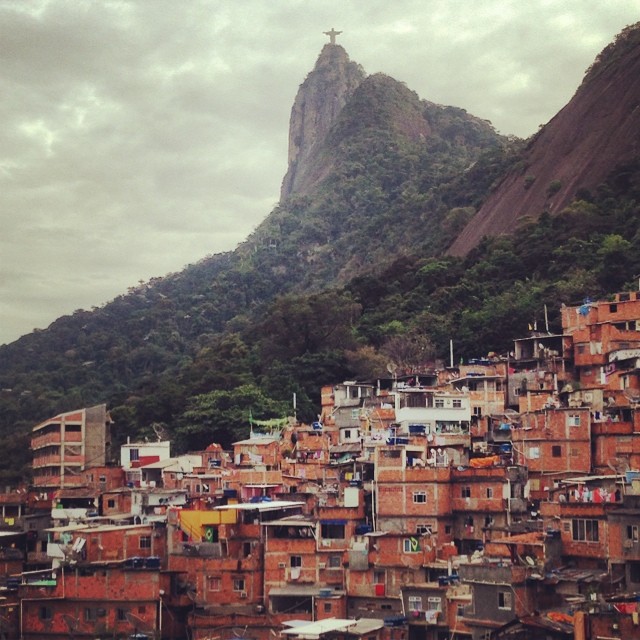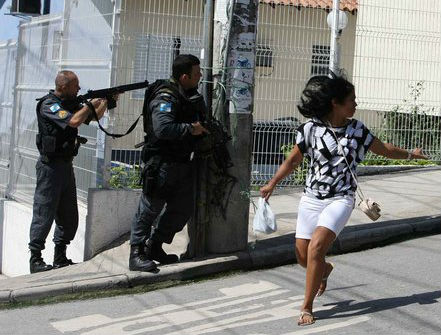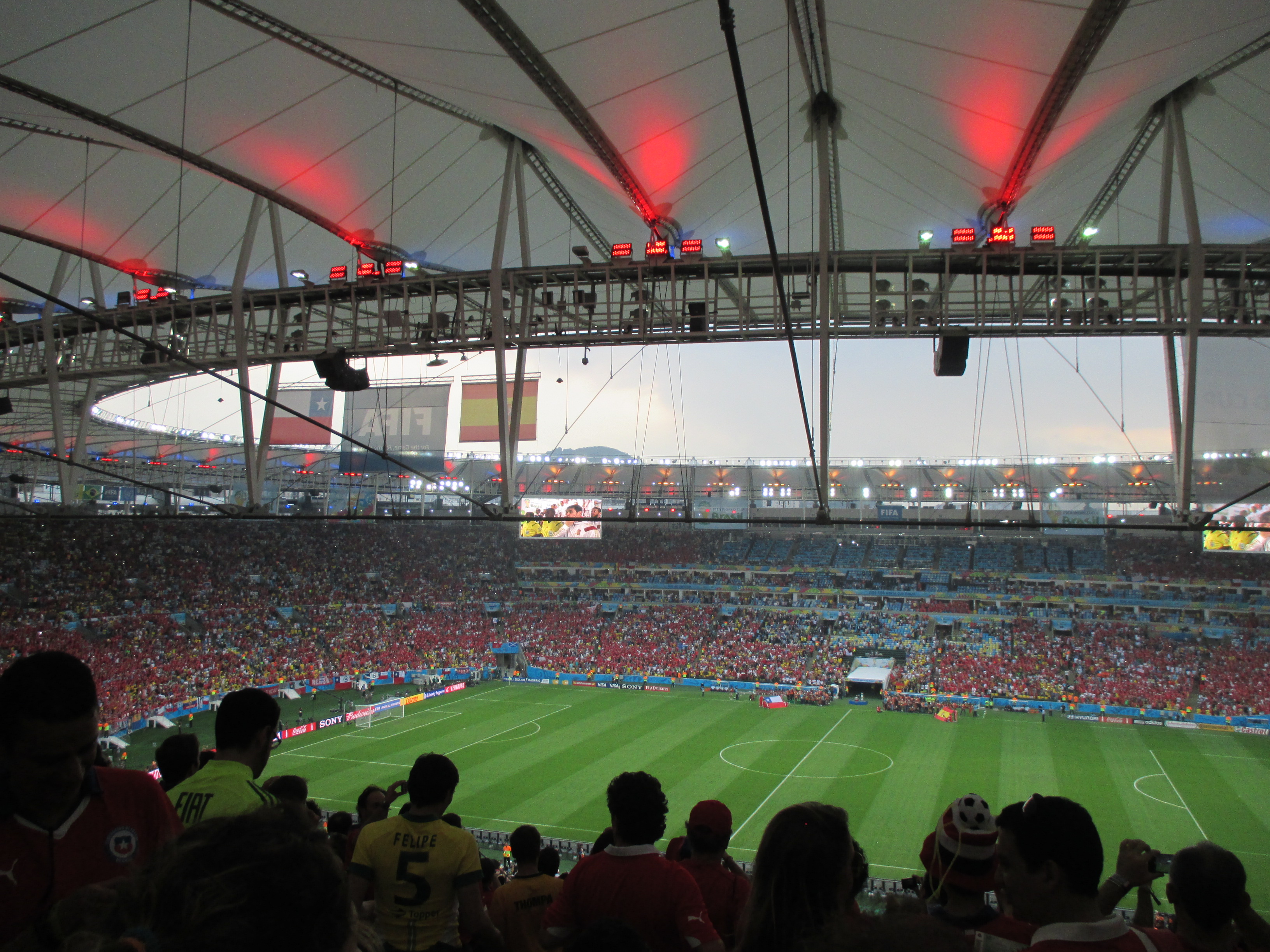Just Past the Stadium, to Your Left.
By: Shannon Noelle Crow
Abstract
This paper has a history almost as old as the mega-events in Brazil. I began writing it in 2012 for a comparative politics class. It was rewritten after my trip to Brazil and then after subsequent classes in development economics where I gained a greater grasp on Latin American state and social history. This article encapsulates both my personal views on state driven development in Brazil and the views of Brazilian citizens I stayed with and talked to both in Brazil and through my research.
This paper allows the reader to analyze the how social inclusion was affected by the World Cup and ascertain how Brazil can approach this during the Olympic Games in 2016. In order to accomplish this, this paper outlines the two philosophies that are driving favela remodeling, a process where Brazilian slums are supposedly integrated into the cities as the country receives a facelift for the FIFA World Cup and the Olympic Games. While the paper is based in academic research, my own point of view serves as the guiding narration how two conflicting developmental philosophies are implemented on the ground level. One approach is short-term and relies upon heavy police subjugation and even forcible removal of favelas and their residents in order to present a more postcard perfect image to foreign tourists and the international arena. The second approach is interdisciplinary, long term, and seeks to break favela marginalization and integrate the favela residents based on their inherent strengths.
Ultimately, the required solution is different than the short term solution which was implemented leading up to the FIFA Cup. However, I believe that it is possible to implement policies such as land reform and community development that will integrate the favelas into the cultural fabric of society. If managed carefully, Brazil can look ahead to a future where all its citizens are united in striving together toward national aspirations.
BRIC by BRIC
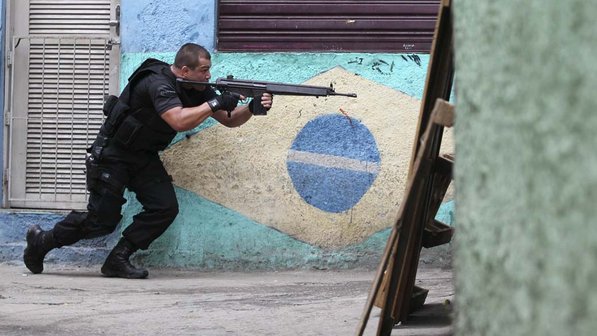 BRIC countries, Brazil, Russia, India, and China, have always fascinated me. Globalization seems to spring up suddenly in little pockets of high-tech skyscraper islands in nations where the majority of the population remain marooned on the shores of economic progress. I had been to India and seen the wild differences that are common in the developing world as modern and traditional clashed in what seemed a never ending montage of opposites. Brazil was next on my list – but I was not prepared for World Cup fever and the larger implications the games had for social inclusion and development in Brazil.
BRIC countries, Brazil, Russia, India, and China, have always fascinated me. Globalization seems to spring up suddenly in little pockets of high-tech skyscraper islands in nations where the majority of the population remain marooned on the shores of economic progress. I had been to India and seen the wild differences that are common in the developing world as modern and traditional clashed in what seemed a never ending montage of opposites. Brazil was next on my list – but I was not prepared for World Cup fever and the larger implications the games had for social inclusion and development in Brazil.
Right now, we are at a unique time in history where we are able to evaluate the effects of the World Cup while hoping for more inclusion, peace, and economic development as the Olympics approach. If this is to happen, the government will have to deal with years of resentment and the entrenched power structures of local drug lords if it wants to pacify the favelas. This is vital if Brazil plans to display a stable and inviting face to the international community.
Stadium Views
While living abroad in Buenos Aires the spring of 2014, I paid close attention to news of widespread rioting and protests in Brazilian cities such as Rio and Sao Paulo. Brazil was at fever pitch just a month before the FIFA World Cup and it seemed that there were daily transportation shut downs and police suppression of protests. Everywhere I looked someone was wearing a jersey, kicking a soccer ball, or discussing how mega-events impact the domestic economy of host countries. In late May I packed a bag and booked a flight to get an authentic view of what was hidden from the glossy FIFA tourist brochures.
After I got off the plane I realized I was almost always safely tucked away in a taxi or rented car when I was in India. My goal in visiting Sao Paulo, Brazil was to experience how globalization affected the social inclusion of all members of society in one of the largest, and most violent, cities in the world.
The Game Plan
Favelado. This is the name given to residents of Brazil’s infamous slums. Categorized by the dwellings they inhabit, these people survive in squatter settlements as Brazil struggles to keep up with its rapid population growth and internal migration. Thousands come to major cities such as Rio de Janeiro or Sao Paulo each year hoping for jobs in a market that is growing, but not able to keep up with demand. They are found by the thousands in ramshackle shacks clinging to mountain sides without basic amenities, controlled by local drug lords and affected by violence. The favelados are excluded from political and social life. They have created their own culture, complete with foods, customs, and dances that are observed within the cramped shacks and the small winding alleyways of the unlit slums.
The name favela was originally coined by Brazilian botanists for a native tree that locals used for building materials. The first favela was established after the Guerra de Canudos civil war, when rebel soldiers set up temporary housing to wait for their government salaries and, upon not receiving payment, never left (Valladares). While the precedent for a lack of government involvement did not change, the term did, and it was eventually applied to the ramshackle settlements built out of the favela trees in and around Brazil’s major cities.
Most of the favelas began in the early 20th century and have continued growing due to Brazil’s rapid economic and population growth (Valladares). Currently there are 12 million Brazilians living in favelas and other unofficial housing settlements across the nation (Reis) Middle- and upper-class Brazilians consider the favelas almost foreign, as they are not incorporated into society. The favelas’ devastating poverty both encourages this exclusion and maintains the cycle of poverty, a vicious cycle that separates the favelados from living as full citizens. Many view the favelas and their inhabitants like a deadly urban disease that must be contained.
Until recent years, the only official governmental effort to acknowledge the favelas was to include their residents in the 1950 census (Valladares). This lack of government involvement has continued, leaving residents in a power vacuum where the government doesn’t have sovereignty over the favelas. These conditions encourage drug trafficking (Straubhaar). Local drug lords to fill the sovereignty gap and provide electricity, water, and occasionally even cable to their territories and monitor local disputes. They are the sociopolitical, stabilizing actors of the slums (Zeller).
Picking Sides
While I was familiar with the history of the favelas, it was difficult to grasp just how much the favelas felt like their own little enclaves until I was right there, walking their streets. Each one had a different feel. I relished the brightly painted shacks and how the residents seemed happy despite their surroundings. Kids broke into spontaneous soccer games and the sounds of funk carioca, a musical blend of Miami bass and African styled beats that is unique to the favelas, filled the humid air. Favela residents have long struggled for social inclusion, or against it, depending on one’s perspective. While the favelados sometimes wear their name and identity proudly, they exist in tension against the state and the Brazilians who see them as outsiders. Without proper services, many fear their children are doomed to grow up without an education or potential to improve their lives. They are defined by their separation from society (Dias and Eslava). While they have their own power structures, the general sentiment from the favelas is that as Brazil grows and becomes a modern nation, the favelados are being left behind.
When Brazil was chosen to host the Federal International Football Association Cup in 2014 and the Olympic games in 2016, the problem of the favelas became apparent to the Brazilian government. Once considered the only way to handle the massive influx of immigrants, the slums were recently reevaluated as a national liability. In the eyes of the international community and local leaders, the favelas were ugly, dangerous, and made people (especially rich tourists) uncomfortable. With the international attention and profits these events garner, the Brazilian government is attempting to find the best method for favela “remodeling” alongside various other international agencies and NGOs, Non-governmental agencies. It has been concluded that Brazil has to provide a stable and safe venue for both tourism and business investment while maintaining social cohesion and preventing riots.
The methods advocated to that end have fallen into two different camps. One method is focused on the short term with the forced removal and military suppression of the favelas and their residents. The long term method is focused on reintegrating the favelas into society while finding ways to remove their dangerous elements.
Burning Bridges to Build Stadiums
Of the two main approaches considered, the proponents of the short term and the long term methods are influenced by the possibilities the games bring. The economic incentives are huge, with big government contracts available, hotel rooms being booked, and the food service industry ready to profit off of the games. The tourist money alone is expected to be in the billions (USD). Local as well as international businesses will take advantage of this revenue as consumers flood into Brazilian cities.
The short term method seeks to use government programs and military power to quickly pacify the favelas and keep the drugs and violence contained and out of public view in order to reap the economic benefits. The long term method favors a more multi-disciplinary approach. It uses land tenure reform, comprehensive government involvement, and community programs to encourage the incorporation of the favelas into Brazilian society and its rising middle class. This will encourage long term prosperity and a more stable Brazil (Sluis). For the purposes of this paper, government is defined in a comprehensive sense, encompassing both local and national levels.
The World Cup and especially the Olympic games bring the opportunity for financial profit as well as the social inclusion of all Brazilian citizens into a cohesive nation. This can only be achieved through a open dialogue between the favelados and the Brazilian government to build trust, as the slums are integrated into Brazil. Rather than continuing to exist as a nation divided by class and perpetuating the marginalization of the favelados, there is a unique opportunity to use government funds and the attention of these mega events to bring support and aid into the favelas.
There are over 600 favelas in and around Rio de Janerio alone, much less the other major cities that will host Olympic Games. In 2012, the Brazilian government has only pacified 18 of the 40 favelas it has planned to install military forces in before the Olympics (Zeller). This violent, short term fix has been primarily accomplished through the “pacification process” of announcing imminent police arrival into an area. Military, para-military, and police forces are all used to go door to door and establish occupation over residents. Due to the previous announcement, this process allows drug lords and other criminals time to get out of the slums before the police take the area by force. This has not put a stop to the crime in Brazil because the drug lords just relocate (Roller). Due to the lucrative trade of drug trafficking, drug lords are heavily armed and must protect their “turf,” or defined boundary they operate within, from the competition of other dealers (Zeller). As drug lords are pushed out of one favela and enter new territory, turf wars break out. This method causes even more violence as drug lords who are not taking an armed stand flee into the established territory of drug lords in other favelas (Roller).
The lack of Brazilian sovereignty in the favelas is apparent when the local power structures of the slums are examined. Although living under drug lords during a turf war can be deadly, many residents still support the drug lords stabilizing role (Zeller). Many favelados are too poor to buy drugs, but they benefit from the peace, utilities, medical care, and community entertainment drug lords provide in return for their silence (McLoughlin). Due to this symbiotic relationship and a history of marginalisation by better-off Brazilians and the state, the majority of the favelados accept the drug lords role. Without the state to turn to, favelas have become more and more excluded as they seek to find ways to feed their families and gain access to basic amenities. These rambling shacks are considered a criminal blight (Reis). However, they are actually cohesive societies created in the absence of government involvement on behalf of its most vulnerable members.

The Brazilian government has neglected to extend services into slums because they are viewed as a nuisance and have been historically ignored unless their problems spill out into the more politically active middle and upper classes (McLoughlin). Due to the mutually beneficial relationship between favela residents and drug lords, the obtrusiveness of the police forces does not encourage closer relations within Brazilian society (Kimmelman). The Brazilian government has yet to encourage constructive dialogue with the favelas beyond demanding basic security for the games (Romero). Because of this negligence many residents consider the new police presence a shallow attempt at fixing the favelas for economic gain they will not benefit from (Dias and Eslava). The Brazilian government cannot expect peace in the streets if they continue to marginalize the favelas (Straubhaar).
As the FIFA World Cup grew closer, stories of police occupation of favelas became more frequent. There was even news of slum housing being bulldozed out of the way with families inside (Romero). With construction for FIFA alone expected to cost over 14 billion USD, eighty percent of which was coming from public taxes, many residents expressed anger over the massive expenditures and disbelief that this would aid the average Brazilian, much less a resident of the favelas (Garcia-Navarro). Chants filled the streets demanding “FIFA pay your fee!” as people marched against public transportation price hikes that were going toward construction and infrastructure for the games (Durao).
Foul Play
For me, the image that perfectly encompassed the tension of the World Cup was jubilant spectators tossing uneaten food into a dumpster as a woman was picking through the trash for her sustenance. You could feel the tension in the air walking the street even before the games began. There was a heavy police presence and the sound of construction and demolition crews filled the streets. Globalization brought Brazil out of third world status and gave it the opportunity to host high visibility mega-events. But Brazil rushed past the favelas, trampling its own citizens in its drive toward modernization.
The government is working on solutions while Rio de Janeiro’s mayor is making “belated and vague” promises of 2,000 new units of housing (Kimmelman). Many times, these housing settlements have removed favela residents from city centers where they are considered unwanted to the outskirts of cities far away from jobs they so desperately need. In Sao Paulo, the government evicted residents without warning, claiming it would pay residents 200 dollars a month for rent until it could build housing for them. Residents such as Drancy Silva claim “we can’t find a place to rent for that amount” as their families face sudden homelessness (Garcia-Navarro). Brazil cannot expect quiet submission from favela residents, and even middle class Brazilians, who are feeling the burden of huge infrastructure developments. Especially given that these classes can’t afford a ticket to see the games.
Tensions are mounting as the Brazilian government uses their urban-combat trained Special Operations Battalion (BOPE) and their Police Pacification Unit (UPP) to establish government sovereignty (McLoughlin).When Brazilian police and military forces move into a new favela they invariably cause a high number of innocent civilian casualties. Due to the proximity of close quarters urban combat, residents are frequently caught in the crossfire. In this scenario, close quarters combat is a tactical style of warfare defined as miltary forces, divided into small teams, attempting a quick, violent takeover of a given area. They will engage targets, or suspected targets, with short-range firearms and even hand-to-hand combat. While the UPP personnel view the deaths as collateral damage in order reassume sovereignty until the government can begin to provide basic amenities and reassume sovereignty, it most certainly does not endear the police to the civilian population. Mortality rates for males in Brazil exceed those in Afghanistan conflict zones, making the city one of the most dangerous places in the world (Burke).This further separates the favelas from Brazilian government and society. This alienation will have negative repercussions if Brazil ever truly seeks to unify its country toward national goals.
Currently, there are no formalized plans beyond military control to remain in the favelas after the games are over. Maintaining a police force in the favelas stretches the resources of the government. If the police leave after the Olympic Games, the favelas would be caught in a power vacuum that would cause more violence as drug lords seek to reestablish territory and people fight for basic resources (Roller). The favelas have traditionally relied on a power structure where drug lords provide services while the residents remain submissive in exchange for necessities (McLoughlin). When the police pursued the drug lords, it removed the only semblance of rule of law and installed military rule. In April of 2011, there was a law passing through the Brazilian congress to mandate that the UPP remain in the pacified favelas for 25 years (McLoughlin). The legislation passed, but the law has been critiqued for a lack of specification, long term planning, and budget allotment. Even this critique excludes the dialogue of the barbaric nature of installing military forces in non-aggressive civilian city sectors. In one favela, the local cartel painted “Don’t worry, we’ll be back” across a house. It is clear neither the drug dealers nor the residents have much faith in the promises of the Brazilian government (Hammer).
The Long Strategy
To sustain prosperity for Brazil the favelas must be integrated into Brazilian society. The tension between the developed sectors of Brazil and the favelas is retarding the integration process and will hamper Brazilian development in the future. Brazil must not focus solely on quick fixes for mega-event security at the detriment of its people (Alexander). As Rio’s Security Secretary Jose Mariano Beltrame emphasizes, “security alone is not enough… It’s time for social investments” (McLoughlin). The national goal should be to create a cohesive social network, not just favela removal for economic gain and attractive stadium views. It is necessary to extend the rule of law to the favelas and reintroduce sovereignty so Brazil can come into global prominence as a unified nation.
A favorable long term solution is sustained government support alongside NGO’s to provide a holistic solution to favela remodeling. By removing drugs from its neighborhoods and providing basic utilities and services like education, government intervention would allow the favelados to break the cycle of poverty. The favelas could create a large working class for Brazil’s growing economy (Straubhaar). As its middle class demands more goods, the untapped potential of the favelados will be vital for continued economic growth. Often called the sleeping giant in regards to its economic potential, Brazil needs to integrate the favelas to utilize the potential for new labor and markets for manufactured goods. In order to effectively integrate the favela residents they must be educated, allowed to find suitable housing, and incorporated into society as citizens and consumers. This would stimulate a manufacturing industry and the economy as favelados and their children would leave jobs in the black market for formal work, increasing Brazil’s GDP (Reis). This would take many years and state funds, which is why it is not considered an attainable or worthy goal by many in the Brazilian government. This costly miscalculation is one of the negative aspects of the more short sighted approach to favela remodeling (Straubhaar).
Humanitarian efforts, government supported or otherwise, are vital for the favela renewal process. Programs which make the effort to take a comprehensive look at the various social factors of Brazil are more successful than ones who seek one-size-fits-all solutions to complex problems. It is important to consider the human element and not just quickly design solutions without considering the lives and the unique culture the favelados have created. For example, a cable car system initiated in November 2010 to facilitate transportation into the downtown area where many residents work largely failed due to the cursory evaluation of the problem (Sluis). In order to complete the project many residents were displaced. In addition, the locals are excluded from operating vendor stalls in the stations, which are reserved for fast food chains and global industries. Ignorance of local realities prevented residents from improving their economic position through local jobs. Because this program did not take into consideration the deeper issues involved, it was a sloppy attempt to address the problem. Many Brazilians and members of the international community believe that the revenue brought in by the World Cup and Olympics will automatically improve favela life and no more “useless” programs are needed. This perfectly describes a mentality focused on “maximum efficiency rather than aiming at the stimulation of the local economy and…local jobs,” which is causing resentment and unrest within the favelas (Sluis).
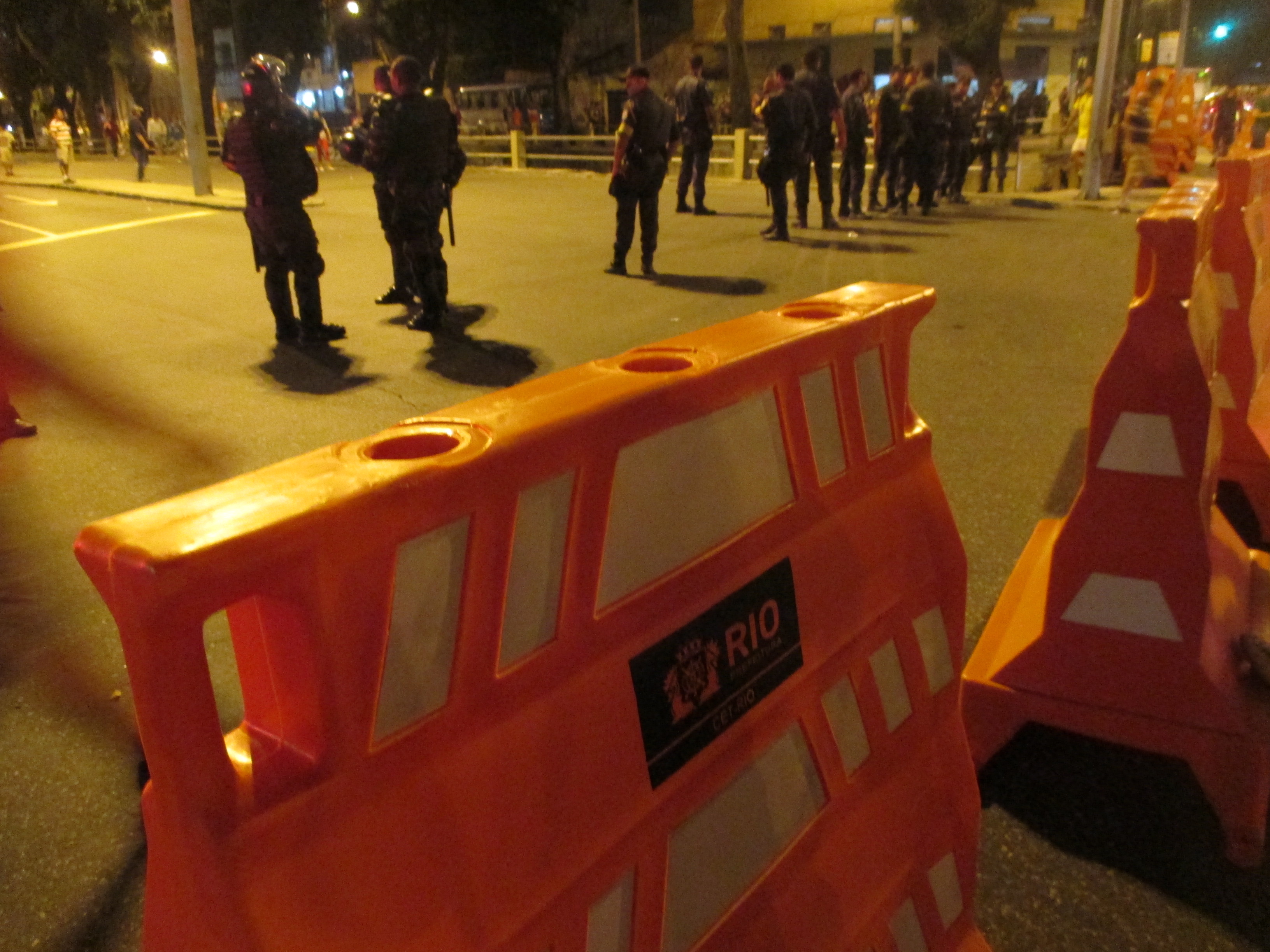
A more comprehensive approach is being pursued by the Favela Barrio Program (FBP) which seeks to gradually incorporate the favelas into communities by using alternate means for land tenure. Traditionally, land tenure allows the residents to have legal hold on the areas they occupy. This has run into problems, as most of the favelas are illegal housing settlements on private or government-owned land. The “costly and complex land titling process” cannot happen on land that is already possessed by another entity (Hanzic). Kenan Hanzic of Habitat International explains that instead of vainly spending resources to achieve full land tenure, the FBP promotes a “state of exception” in order to allow their program to continue to help residents by giving them legal rights to the land (Hanzic). By utilizing the FBP, the government is allowing favela residents to enter into Brazilian society by effectively using resources and time with the games approaching. This program, while certainly helpful in the short run, is also providing a transition to long term stability as the favelas are legally and physically integrated into city life. Programs like these give the government the ability to provide housing with regulated utilities which will break the favelado’s dependency on drug lords, thus lowering crime rates (Zeller). As the community is built and strengthened over time, the government will have an easier time extending its sovereignty into the former favelas to form a unified Brazil.
The FBP has created an efficient process which grants favelados stability by providing legal protection to the homes many have lived in for generations. Brazil’s goal of unifying the favelas into the framework of the city requires more than the current subjugation under police force and removal of drug related violence. A successful transition into more “formal neighborhoods” would bring resources to the slums, remove the need for the drug lords, and integrate the favelas (Handzic). With the assurance of ownership the favelados will be more willing to invest in a future Brazil they can actively participate in – without fearing their homes will be bulldozed around them.
Pre-game
In order to promote more productive social cohesion of Brazilian society despite the potential for forces of globalization to increase tension and inequality in nations, government sovereignty must extend permanently into the favelas. This will be accomplished by three connected developments. First, sovereignty must be extended into the favelas to create a Brazil the favelados can consider themselves true citizens of. Once they are incorporated as full members of society they will gain a voice in government and be protected under the equal rule of law. Secondly, by creating an environment where basic services are provided by a legitimate government, the favelados connection to the drug lords will be severed. This will help the government dismantle the drug lords’ power structures over the favelados, ending turf war violence and drug problems (Dias and Eslava). As an integrated part of Brazil, the favelados’ need to rely on drug lords will diminish, lowering the crime rate and removing drugs from the streets. Finally, it will create a stabilizing force in community development as favelados increasingly participate in society, thus breaking their marginalized status. As regulated housing and infrastructure enters the former favelas, they will gradually transition into neighborhoods and their residents will become more educated (Straubhaar).
Long term policies and socioeconomic aid is necessary for the favelas and their residents to become a contributing aspect of Brazilian society. Some short term measures, such as pacification, were used to quickly contain the violence and reap the economic benefits provided by the FIFA soccer cup in 2014 at great social cost. Hopefully the Olympic Games in 2016 will be different. However, a more future oriented and interdisciplinary look at the favelas is necessary to provide efficient, knowledgeable solutions for the long term prosperity of Brazil.
References
Burke, Jason. “Street Theatre.” The Guardian. Guardian News and Media, 20 Mar. 2004. Web. 18 Nov. 2014.
Dias, Maria Clara, and Luis Eslava. “Horizons of Inclusion: Life Between Laws and Developments in Rio De Janeiro (with Maria Clara Dias).” University of Miami Inter-American Law Review, Spring 2013. Web. 21 Feb. 2015.
Durao, Susana. “Is Nonviolent Policing Possible in Brazil? — Cultural Anthropology.”Culanth.org. Cultural Anthropology, 20 Dec. 2013. Web. 21 Feb. 2015.
Garcia-Navarro, Lourdes. “Brazil Tramples Poor Citizens In Its Rush To Glory.” NPR. National Public Radio, 28 June 2013. Web. 21 Feb. 2015.
Hammer, Joshua. “A Look Into Brazil’s Makeover of Rio’s Slums.” Smithsonian.com. The Smithsonian Institute, 13 Jan. 2013. Web. 24 Feb. 2015.
Handzic, Kenan. “Is Legalized Land Tenure Necessary in Slum Upgrading? Learning from Rio’s Land Tenure Policies in the Favela Barrio Program.” Habitat International 34.1 (2009): n. pag. Ebscohost.com. Ebsco Publishing. Web. 20 Nov. 2014.
Kimmelman, Michael. “A Divided Rio De Janeiro, Overreaching for the World.” The New York Times, 25 Nov. 2013. Web. 22 Feb. 2015.
Malhado, Acacia, Lindemberg Araujo, and Richard Ladle. “Missed Opportunities: Sustainable Mobility and the 2014 FIFA World Cup in Brazil.” Elsevier. Journal of Transport Geography, 2013. Web. 22 Feb. 2015.
McLoughlin, Beth. “Will Crime Crackdown Transform Rio’s Shantytowns?” BBC News. BBC, 20 Nov. 2014.
“Research and Markets: Brazil Defense and Security Report for the Q4 2011 – Government Actively Improving Security in Favelas Before World Cup & Olympic Games.” Business Monitor International (2011): Ebscohost.com. Ed. Terence Aexander. EBSCO Publishing, n.d. Web. 14 Nov. 2014.
Roller Zöe. “BOPE Occupies Complexo De Maráfác Favela” The Rio Times. Brazil News Agency, Inc, 14 Nov. 2014.
Romero, Simon. “Slum Dwellers Are Defying Brazil’s Grand Design for Olympics.” The New York Times. The New York Times, 04 Mar. 2012. Web. 23 Feb. 2015.
Sluis, Ellen. The Opening up of the Favela. Thesis. Universiteit Utrecht, 2012. Utrecht: Faculty of Humanities Theses, 2012. Print.
Straubhaar, Rolf. “A Broader Definition of Fragile States: The Communities and Schools of Brazil’s Favelas.” Current Issues in Comparative Education 15 (2012): 41-51. Print.
“Unidas, Favelas E Comunidades Formariam O 5º Maior Estado Do País.” CartaCapital. Trans. Arianne Reis. N.p., 20 Feb. 2014. Web. 2 Apr. 2015.
Valladares, Licia. Lanic Text Collection. SOCIAL SCIENCE REPRESENTATIONS OF FAVELAS IN RIO DE JANERIO: A HISTORICAL PERSPECTIVE. University of Texas, n.d. Web. 25 Nov. 2014.
Zeller, Mariana Van. “City of God, Guns, & Gangs.” Current TV, 27 Apr. 2012. Web. 10 Nov. 2014.
Author Bio
 Shannon Noelle is a senior Honors student majoring in Global Studies with a focus in Latin America and Economics at St. Edward’s University. She travelled to several countries including India, Brazil, Chile, Argentina, Canada, and Mexico. When in Austin, she enjoys its local food culture and Latin dance scene.Her next trip is to Japan to complete an intensive Japanese course and her degree. This paper applies insights gained in Brazil to larger themes of globalization and how politics influence the quality of life for all members of society. Shannon Noelle plans to take a gap year volunteering as Resident Mentor at Casa Marianella, a shelter for refugees. This is to prepare for her entrance into the Foreign Service and her enrollment in the University of San Diego for a Masters in Economics degree in Pacific Rim studies.
Shannon Noelle is a senior Honors student majoring in Global Studies with a focus in Latin America and Economics at St. Edward’s University. She travelled to several countries including India, Brazil, Chile, Argentina, Canada, and Mexico. When in Austin, she enjoys its local food culture and Latin dance scene.Her next trip is to Japan to complete an intensive Japanese course and her degree. This paper applies insights gained in Brazil to larger themes of globalization and how politics influence the quality of life for all members of society. Shannon Noelle plans to take a gap year volunteering as Resident Mentor at Casa Marianella, a shelter for refugees. This is to prepare for her entrance into the Foreign Service and her enrollment in the University of San Diego for a Masters in Economics degree in Pacific Rim studies.

